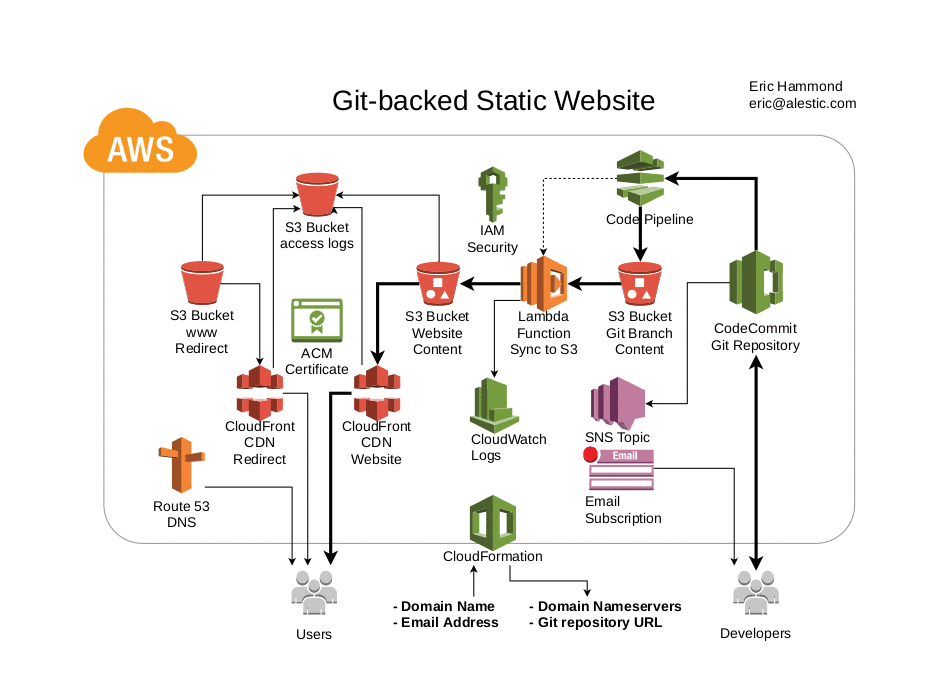Please read the following blog article for more information:
This project contains a YAML CloudFormation template that, by default, creates a CodeCommit Git repository and a static https website, along with the necessary AWS infrastructure glue so that every change to content in the Git repository is automatically deployed to the static web site.
The website can serve the exact contents of the Git repository, or a static site generator plugin (e.g., Hugo) can be specified on launch to automatically generate the site content from the source in the Git repository.
The required stack parameters are a domain name and an email address.
The primary output values are a list of nameservers to set in your domain's registrar and a Git repository URL for adding and updating the website content.
CodeCommit Git repository event notifications are sent to an SNS topic and your provided email address is initially subscribed.
Access logs for the website are stored in an S3 bucket.
Benefits of this architecture include:
-
Trivial to launch - Can use aws-cli or AWS console (click "launch" above)
-
Maintenance-free - Amazon is responsible for managing all the services used.
-
Negligible cost at substantial traffic volume - Starts off as low as $0.51 per month if running alone in a new AWS account. (Route 53 has no free tier.) Your cost may vary over time and if other resources are running in your AWS account.
-
Scales forever - No action is needed to support more web site traffic, though the costs for network traffic and DNS lookups will start to add up to more than a penny per month.
This CloudFormation stack has an AWS Lambda plugin architecture that supports arbitrary static site generators. Here are some generator plugins that are currently available
-
Identity transformation plugin - This copies the entire Git repository content to the static website with no modifications. This is currently the default plugin for the static website CloudFormation template.
-
Subdirectory plugin - This plugin is useful if your Git repository has files that should not be included as part of the static site. It publishes a specified subdirectory (e.g., "htdocs" or "public-html") as the static website, keeping the rest of your repository private.
-
Hugo plugin - This plugin runs the popular Hugo static site generator. The Git repository should include all source templates, content, theme, and config.
You are welcome to make your own static site generators based on one of these and pass it into the CloudFormation stack.
Here is the basic approach to creating the stack with CloudFormation.
domain=example.com
email=yourrealemail@anotherdomain.com
template=aws-git-backed-static-website-cloudformation.yml
stackname=${domain/./-}-$(date +%Y%m%d-%H%M%S)
region=us-east-1
aws cloudformation create-stack \
--region "$region" \
--stack-name "$stackname" \
--capabilities CAPABILITY_IAM \
--template-body "file://$template" \
--tags "Key=Name,Value=$stackname" \
--parameters \
"ParameterKey=DomainName,ParameterValue=$domain" \
"ParameterKey=NotificationEmail,ParameterValue=$email"
echo region=$region stackname=$stackname
The above defaults to the Identity transformation plugin. You can specify the Hugo static site generator plugin by adding these parameters:
"ParameterKey=GeneratorLambdaFunctionS3Bucket,ParameterValue=run.alestic.com" \
"ParameterKey=GeneratorLambdaFunctionS3Key,ParameterValue=lambda/aws-lambda-site-generator-hugo.zip"
Go to the email address you used above and approve the SNS topic subscription.
When the stack starts up, the ACM certificate will be in "pending" status until you verify ownership of the domain.
If you are using "EMAIL" as the CertificateValidationMethod, then you need to open the email sent to the address associated with your domain's registration and approve it.
If you are using "DNS" as the CertificateValidationMethod, then go to the AWS Certificate Manager (ACM) console, find the two pending certificates, and click "Create record in Route 53" for both.
Once the ACM certificates are verified, the CloudFront distributions will be created. This can take 20-40+ minutes to complete.
hosted_zone_id=$(aws cloudformation describe-stacks \
--region "$region" \
--stack-name "$stackname" \
--output text \
--query 'Stacks[*].Outputs[?OutputKey==`HostedZoneId`].[OutputValue]')
echo hosted_zone_id=$hosted_zone_id
aws route53 get-hosted-zone \
--id "$hosted_zone_id" \
--output text \
--query 'DelegationSet.NameServers'
Set nameservers in your domain registrar to the above.
git_clone_url_http=$(aws cloudformation describe-stacks \
--region "$region" \
--stack-name "$stackname" \
--output text \
--query 'Stacks[*].Outputs[?OutputKey==`GitCloneUrlHttp`].[OutputValue]')
echo git_clone_url_http=$git_clone_url_http
repository=$domain
profile=$AWS_PROFILE # The correct aws-cli profile name
git clone \
--config 'credential.helper=!aws codecommit --profile '$profile' --region '$region' credential-helper $@' \
--config 'credential.UseHttpPath=true' \
$git_clone_url_http
cd $repository
Thanks to the folks at Elementryx, this CloudFormation template has been extended to support public and private repositories in GitHub as an alternative to AWS CodeCommit.
Your GitHub repository must already exist when you create or update the CloudFormation stack. You must also generate a (secret) personal access token on GitHub and save it in AWS SSM Parameter Store.
Here are Amazon's instructions for generating the GitHub personal access token on GitHub (ignore the steps after you generate the token on GitHub and copy it):
https://docs.aws.amazon.com/quickstart/latest/cicd-taskcat/step2.html
Once you have the token, save it in SSM Parameter Store:
github_token="YOUR-SECRET-GITHUB-TOKEN"
github_token_key="/YOUR-SSM-PARAMETER-STORE-KEY-FOR-GITHUB-TOKEN"
# Should be SecureString, but not yet supported by CloudFormation!
aws ssm put-parameter \
--type String \
--name "$github_token_key" \
--value "$github_token"
unset github_token
Now set up these environment variables:
source_type=GitHub
github_user="YOUR-GITHUB-USER"
github_repository="YOUR-GITHUB-REPO"
github_token_key="SAME-AS-ABOVE"
and pass in these parameters when creating or updating the CloudFormation stack above:
"ParameterKey=SourceType,ParameterValue=$source_type" \
"ParameterKey=GitHubRepository,ParameterValue=$github_repository" \
"ParameterKey=GitHubUser,ParameterValue=$github_user" \
"ParameterKey=GitHubToken,ParameterValue=$github_token_key"
aws cloudformation delete-stack \
--region "$region" \
--stack-name "$stackname"
This leaves behind:
- Route 53 hosted zone
- S3 buckets
- Git repository
domain=...
hosted_zone_id=$(
aws route53 list-hosted-zones \
--output text \
--query 'HostedZones[?Name==`'$domain'.`].Id'
)
echo hosted_zone_id=$hosted_zone_id
aws route53 delete-hosted-zone \
--id "$hosted_zone_id"
# WARNING! DESTROYS CONTENT AND LOGS!
aws s3 rm --recursive s3://logs.$domain
aws s3 rb s3://logs.$domain
aws s3 rm --recursive s3://$domain
aws s3 rb s3://$domain
aws s3 rb s3://www.$domain
aws s3 rm --recursive s3://codepipeline.$domain
aws s3 rb s3://codepipeline.$domain
That last command will fail, so go use the web console to delete the versioned codepipeline bucket.
# WARNING! DESTROYS CONTENT!
#aws codecommit delete-repository \
--region "$region" \
--repository-name "$domain"

